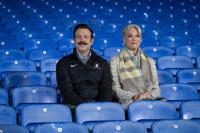HALIFAX - A professor at Dalhousie University is offering a course using the philosophies of fictional soccer coach Ted Lasso as a guide to — among other things — building honest relationships and learning to be curious about other people.Â
The idea began during a casual chat between Lori Dithurbide, a professor in the school of health and human performance, and a colleague about the pedagogical possibilities of the Apple TV+ comedy series, which the educator first watched as a tonic to the pandemic.
Now, there are already over 142 students from various undergraduate disciplines signed up for the winter course titled "Lessons from Ted Lasso."
In an interview Friday, the professor said the episodes from its first three seasons are rich ground for discussions that promote critical thinking and self-reflection. The curriculum also explores social justice issues and dips into sports psychology and sociology.Â
In the first portion of her course, Dithurbide said she expects to be discussing a Season 1 scene where the coach from Kentucky defeats Rupert Mannion, the self-absorbed and immensely wealthy ex-husband of the team's owner, Rebecca Welton, in a game of darts.
As he makes the winning throws, Lasso — played by Jason Sudeikis — uses the occasion as a teaching moment, explaining to Mannion — played by Anthony Head — that we risk underestimating others if we don't try to understand their lives and talents. Lasso urges his opponent to "be curious, not judgmental."Â
Dithurbide, who has worked as a mental performance consultant at two Olympic games, said the scene will likely be part of discussions on group dynamics and how to approach people you're in a relationship with.
 "If you just take a minute and think ... maybe there's other things happening in people's lives. Maybe there's context to or reason or explanations to why people behave the way they do," she said.
The series began with an act of treachery. Welton — the team owner played by Hannah Waddingham — brings Lasso, who knows little about soccer, to the English Premier League in a deliberate attempt to destroy her team's chances and therefore wreak vengeance upon her former husband, who loves the club.Â
Won over by Lasso's relentlessly positive actions and attitude, she admits her betrayal. Lasso, going through his own divorce, forgives her.
Dithurbide said the theme of forgiveness, which recurs throughout the series, paves the way for discussion on how people treat one another, on and off sports fields.
Opening up truthfully to another human being may, as Lasso puts it, quoting the Gospel of John, "set you free." Â In Season 2, Lasso's therapist, while helping the coach unburden from his own anger, adds the truth, "will also piss you off."
"The show does a good job of thinking about the whole process of relationships and how they start, how they develop, and also how they end. What is it like to forgive somebody? What does it take? What are the implications of it?" said the 42-year-old professor.
Laurene Rehman, the director of the Dalhousie school of health and human performance, said the course's appeal may lie in the desire shared by coaches and leaders from many walks of life to explore good practices, using a resource that has broad, popular appeal.
"I think she (Dithurbide) was seeing things going on in terms of sporting practices that aren't great," said Rehman, adding the use of fear tactics or verbal berating by some coaches aren't effective in the long term. Lasso's relentlessly positive attitude creates a different role model, she said.
Dithurbide said she'll be asking students to "look inside themselves and reflect a little bit more and think about how their own experiences can relate to some of the themes in the show."
"But self-reflection and self-awareness are not always fun. Â ... Nobody's perfect. So, you're going to find things you don't love," she said.
At one point in the locker-room, Lasso urges his despondent team to sit with sadness and recall that experiencing sadness alone is even worse. But he also teaches them about the virtues of the relatively short memory span of the goldfish and the merits of forgetting.
The professor says it is basic sport psychology to let athletes and coaches "sit" with something that is disappointing and sad and accept they're real and valid, rather than "pretending it didn't happen."
"But I always tell athletes, you don't want to pay with your emotions longer than what it's worth. You need to sit with it, feel it, but then you also need to move on," she said.
This report by şĂÉ«tvwas first published April 12, 2025.










































